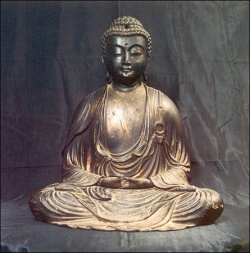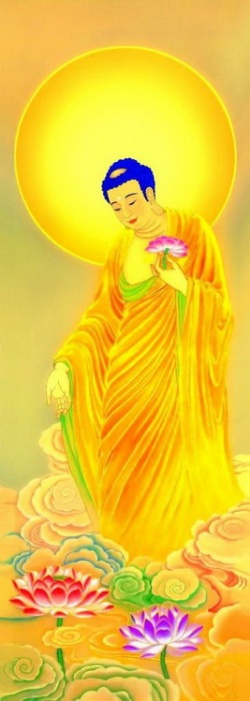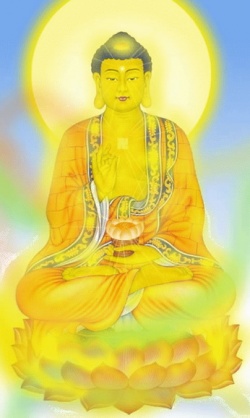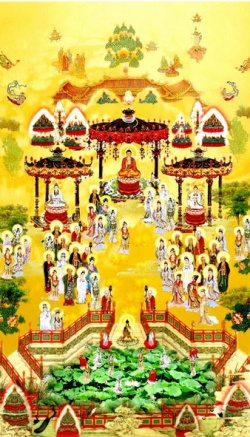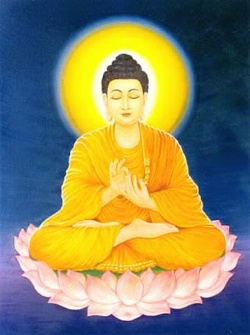Amitabha Buddha
Amitabha, Sanskrit word, literally means boundless light and boundless life. He is the Buddha in the Land of Ultimate Bliss (Pure Land), in which all beings enjoy unbounded happiness. Amitabha has forty-eight great vows to establish and adorn his Pure Land. People also recite or call upon his name by the time of dying will be born in the Land of Ultimate Bliss with the reception by Amitabha. Amitabha is one of the most popular and well-known Buddha in China.
Pure Land of Ultimate
This is the Buddha Land of Amitabha Buddha. In Amitabha Sutra, there is full description about this Pure Land. This is the world of utmost joy without suffering. With the spiritual power of Amitabha Buddha, all beings in this world will understand Buddhism easily and practise diligently, and attain enlightenment eventually. Therefore by reciting Amitabha Buddha's name, Buddhist followers hope that they will be born in this Pure Land after their lives on earth.
Nine grades of Buddhists to be born in the Pure Land
Nine Stages of Lotus Flowers or Nine Grades, Classes of Lotus Flowers, i.e. upper superior, middle superior, lower superior, upper medium, middle medium, lower medium, upper inferior, middle inferior and lower inferior, which represent ninefold future life into Pure Land. The nine grades, or rewards, of the Pure Land, corresponding to the nine grades of development in the previous life, upon which depends, in the next life, one's distance from Amitabha, the consequent aeons that are required to approach Amitabha, and whether one's lotus will open early or late.
1.Those of genuine faith and firm resolution, who are still distracted of mind during reciting, will be born into the lower inferior of the Buddhaland.
2.Those who have overcome their distractions more or less will be born into the middle inferior.
3.Those who are free from distractions will be born into the upper inferior.
The aforementioned three grades of beings, though still subjected to illusions of perceptions, would be born in the Buddhaland where saints and layman live together (the four Buddhalands of Supreme Happiness are all Pure Lands). Once born there, never will they recede. (According to the doctrine of some other Buddhist sects, however, one must wipe out all illusions from perception if he is to attain the coveted Never-Receding Position.)
Those who can recite without negligence and distraction at all times and also recite with an unperturbed mind like an Arhat, shall be born into the Temporary Realm and shall be graded in the upper, middle and lower, medium.
Those who can realise, by self-experiencing, the ultimate reality under-lying everything, and non-differentiation between mind and Buddha, and who, like the Ignorance-free Bodhisattvas, are detached from any influence, shall be graded in the upper superior, middle superior or lower superior and shall be born in The Realm of Permanent Reward and Freedom and the Realm of Eternal Light and Tranquillity.
As it is profound, simple and adaptable to the followers at all levels, the Name-reciting Method is popular, appealing and universal.
Praise To Amitabha Buddha
The Amitabha Buddha's body is the colour gold.
The splendour of his brilliant light is beyond mind.
The light of his brows illuminates a hundred worlds.
His eyes are pure brilliant light, limitless like the oceans.
In Amitabha's realm of infinite light, all beings are transformed
And Enlightened into countless Bodhisattvas and Buddhas.
His Forty Eight Vows ensure our liberation
In Nine Lotus Stages we reach the ultimate shore of Enlightenment.
Homage to the Buddha of the Pure Land,
Compassionate Amitabha Buddha.
NAMO AMITABHA BUDDHA!
NAMO AMITABHA BUDDHA!
NAMO AMITABHA BUDDHA!
The Forty-Eight Vows
Translated from Chinese by Hisao Inagaki
(1) If, when I attain Buddhahood, should there be in my land a hell, a realm of hungry spirits or a realm of animals, may I not attain perfect Enlightenment.
(2) If, when I attain Buddhahood, humans and devas in my land should after death fall again into the three evil realms, may I not attain perfect Enlightenment.
(3) If, when I attain Buddhahood, humans and devas in my land should not all be the colour of pure gold, may I not attain perfect Enlightenment.
(4) If, when I attain Buddhahood, humans and devas in my land should not all be of one appearance, and should there be any difference in beauty, may I not attain perfect Enlightenment.
(5) If, when I attain Buddhahood, humans and devas in my land should not remember all their previous lives, not knowing at least the events which occurred during the previous hundred thousand kotis of nayutas of kalpas, may I not attain perfect Enlightenment.
(6) If, when I attain Buddhahood, humans and devas in my land should not possess the divine eye of seeing at least a hundred thousand kotis of nayutas of Buddha-lands, may I not attain perfect Enlightenment.
(7) If, when I attain Buddhahood, humans and devas in my land should not possess the divine ear of hearing the teachings of at least a hundred thousand kotis of nayutas of Buddhas and should not remember all of them, may I not attain perfect Enlightenment.
(8) If, when I attain Buddhahood, humans and devas in my land should not possess the faculty of knowing the thoughts of others, even those of all sentient beings living in a hundred thousand kotis of nayutas of Buddha-lands, may I not attain perfect Enlightenment.
(9) If, when I attain Buddhahood, humans and devas in my land should not possess the supernatural power of travelling anywhere in one instant, even beyond a hundred thousand kotis of nayutas of Buddha-lands, may I not attain perfect Enlightenment.
(10) If, when I attain Buddhahood, humans and devas in my land should give rise to thoughts of self-attachment, may I not attain perfect Enlightenment.
(11) If, when I attain Buddhahood, humans and devas in my land should not dwell in the Definitely Assured State and unfailingly reach Nirvana, may I not attain perfect Enlightenment.
(12) If, when I attain Buddhahood, my light should be limited, unable to illuminate even a hundred thousand kotis of nayutas of Buddha-lands, may I not attain perfect Enlightenment.
(13) If, when I attain Buddhahood, my life-span should be limited, even to the extent of a hundred thousand kotis of nayutas of kalpas, may I not attain perfect Enlightenment.
(14) If, when I attain Buddhahood, the number of the shravakas in my land could be known, even if all the beings and pratyekabuddhas living in this universe of a thousand million worlds should count them during a hundred thousand kalpas, may I not attain perfect Enlightenment.
(15) If, when I attain Buddhahood, humans and devas in my land should have limited life-spans, except when they wish to shorten them in accordance with their previous vows, may I not attain perfect Enlightenment.
(16) If, when I attain Buddhahood, humans and devas in my land should even hear of any wrongdoing, may I not attain perfect Enlightenment.
(17) If, when I attain Buddhahood, innumerable Buddhas in the land of the ten directions should not all praise and glorify my Name, may I not attain perfect Enlightenment.
(18) If, when I attain Buddhahood, sentient beings in the lands of the ten directions who sincerely and joyfully entrust themselves to me, aspire to be born in my land, and call my Name even ten times, should not be born there, may I not attain perfect Enlightenment. Excluded, however, are those who commit the five gravest offences and abuse the right Dharma.
(19) If, when I attain Buddhahood, sentient beings in the lands of the ten directions, who awaken aspiration for Enlightenment, do various meritorious deeds and sincerely desire to be born in my land, should not, at their death, see me appear before them surrounded by a multitude of sages, may I not attain perfect Enlightenment.
(20) If, when I attain Buddhahood, sentient beings in the lands of the ten directions who, having heard my Name, concentrate their thoughts on my land, do various meritorious deeds and sincerely transfer their merits towards my land with a desire to be born there, should not eventually fulfil their aspiration, may I not attain perfect Enlightenment.
(21) If, when I attain Buddhahood, humans and devas in my land should not all be endowed with the thirty-two physical characteristics of a Great Man, may I not attain perfect Enlightenment.
(22) If, when I attain Buddhahood, bodhisattvas in the Buddha-lands of other directions who visit my land should not ultimately and unfailingly reach the Stage of Becoming a Buddha after One More Life, may I not attain perfect Enlightenment. Excepted are those who wish to teach and guide sentient beings in accordance with their original vows. For they wear the armour of great vows, accumulate merits, deliver all beings from birth-and-death, visit Buddha-lands to perform the bodhisattva practices, make offerings to Buddhas, Tathagatas, throughout the ten directions, enlighten uncountable sentient beings as numerous as the sands of the River Ganges, and establish them in the highest, perfect Enlightenment. Such bodhisattvas transcend the course of practice of the ordinary bodhisattva stages and actually cultivate the virtues of Samantabhadra.
(23) If, when I attain Buddhahood, bodhisattvas in my land, who would make offerings to Buddhas through my divine power, should not be able to reach immeasurable and innumerable kotis of nayutas of Buddha-lands in the short time it takes to eat a meal, may I not attain perfect Enlightenment.
(24) If, when I attain Buddhahood, bodhisattvas in my land should not be able, as they wish, to perform meritorious acts of worshipping the Buddhas with the offerings of their choice, may I not attain perfect Enlightenment.
(25) If, when I attain Buddhahood, bodhisattvas in my land should not be able to expound the Dharma with the all-knowing wisdom, may I not attain perfect Enlightenment.
(26) If, when I attain Buddhahood, there should be any bodhisattva in my land not endowed with the body of the Vajra-god Narayana, may I not attain perfect Enlightenment.
(27) If, when I attain Buddhahood, sentient beings should be able, even with the divine eye, to distinguish by name and calculate by number all the myriads of manifestations provided for the humans and devas in my land, which are glorious and resplendent and have exquisite details beyond description, may I not attain perfect Enlightenment.
(28) If, when I attain Buddhahood, bodhisattvas in my land, even those with little store of merit, should not be able to see the Bodhi-tree which has countless colours and is four million li in height, may I not attain perfect Enlightenment.
(29) If, when I attain Buddhahood, bodhisattvas in my land should not acquire eloquence and wisdom in upholding sutras and reciting and expounding them, may I not attain perfect Enlightenment.
(30) If, when I attain Buddhahood, the wisdom and eloquence of bodhisattvas in my land should be limited, may I not attain perfect Enlightenment.
(31) If, when I attain Buddhahood, my land should not be resplendent, revealing in its light all the immeasurable, innumerable and inconceivable Buddha-lands, like images reflected in a clear mirror, may I not attain perfect Enlightenment.
(32) If, when I attain Buddhahood, all the myriads of manifestations in my land, from the ground to the sky, such as palaces, pavilions, ponds, streams and trees, should not be composed both of countless treasures, which surpass in supreme excellence anything in the worlds of humans and devas, and of a hundred thousand kinds of aromatic wood, whose fragrance pervades all the worlds of the ten directions, causing all bodhisattvas who sense it to perform Buddhist practices, then may I not attain perfect Enlightenment.
(33) If, when I attain Buddhahood, sentient beings in the immeasurable and inconceivable Buddha-lands of the ten directions, who have been touched by my light, should not feel peace and happiness in their bodies and minds surpassing those of humans and devas, may I not attain perfect Enlightenment.
(34) If, when I attain Buddhahood, sentient beings in the immeasurable and inconceivable Buddha-lands of the ten directions, who have heard my Name, should not gain the bodhisattva's insight into the non-arising of all dharmas and should not acquire various profound dharanis, may I not attain perfect Enlightenment.
(35) If, when I attain Buddhahood, women in the immeasurable and inconceivable Buddha-lands of the ten directions who, having heard my Name, rejoice in faith, awaken aspiration for Enlightenment and wish to renounce womanhood, should after death be reborn again as women, may I not attain perfect Enlightenment.
(36) If, when I attain Buddhahood, bodhisattvas in the immeasurable and inconceivable Buddha-lands of the ten directions, who have heard my Name, should not, after the end of their lives, always perform sacred practices until they reach Buddhahood, may I not attain perfect Enlightenment.
(37) If, when I attain Buddhahood, humans and devas in the immeasurable and inconceivable Buddha-lands of the ten directions, who, having heard my Name, prostrate themselves on the ground to revere and worship me, rejoice in faith, and perform the bodhisattva practices, should not be respected by all devas and people of the world, may I not attain perfect Enlightenment.
(38) If, when I attain Buddhahood, humans and devas in my land should not obtain clothing, as soon as such a desire arises in their minds, and if the fine robes as prescribed and praised by the Buddhas should not be spontaneously provided for them to wear, and if these clothes should need sewing, bleaching, dyeing or washing, may I not attain perfect Enlightenment.
(39) If, when I attain Buddhahood, humans and devas in my land should not enjoy happiness and pleasure comparable to that of a monk who has exhausted all the passions, may I not attain perfect Enlightenment.
(40) If, when I attain Buddhahood, the bodhisattvas in my land, who wish to see the immeasurable glorious Buddha-lands of the ten directions, should not be able to view all of them reflected in the jewelled trees, just as one sees one's face reflected in a clear mirror, may I not attain perfect Enlightenment.
(41) If, when I attain Buddhahood, bodhisattvas in the lands of the other directions who hear my Name should, at any time before becoming Buddhas, have impaired, inferior or incomplete sense organs, may I not attain perfect Enlightenment.
(42) If, when I attain Buddhahood, bodhisattvas in the lands of the other directions who hear my Name should not all attain the samadhi called 'pure emancipation' and, while dwelling therein, without losing concentration, should not be able to make offerings in one instant to immeasurable and inconceivable Buddhas, World-Honoured Ones, may I not attain perfect Enlightenment.
(43) If, when I attain Buddhahood, bodhisattvas in the lands of the other directions who hear my Name should not after death be reborn into noble families, may I not attain perfect Enlightenment.
(44) If, when I attain Buddhahood, bodhisattvas in the lands of the other directions who hear my Name should not rejoice so greatly as to dance and perform the bodhisattva practices and should not acquire stores of merit, may I not attain perfect Enlightenment.
(45) If, when I attain Buddhahood, bodhisattvas in the lands of the other directions who hear my Name should not all attain the samadhi called 'universal equality' and, while dwelling therein, should not always be able to see all the immeasurable and inconceivable Tathagatas until those bodhisattvas, too, become Buddhas, may I not attain perfect Enlightenment.
(46) If, when I attain Buddhahood, bodhisattvas in my land should not be able to hear spontaneously whatever teachings they may wish, may I not attain perfect Enlightenment.
(47) If, when I attain Buddhahood, bodhisattvas in the lands of the other directions who hear my Name should not instantly reach the Stage of Non-retrogression, may I not attain perfect Enlightenment.
(48) If, when I attain Buddhahood, bodhisattvas in the lands of the other directions who hear my Name should not instantly gain the first, second and third insights into the nature of dharmas and firmly abide in the truths realised by all the Buddhas, may I not attain perfect Enlightenment.
